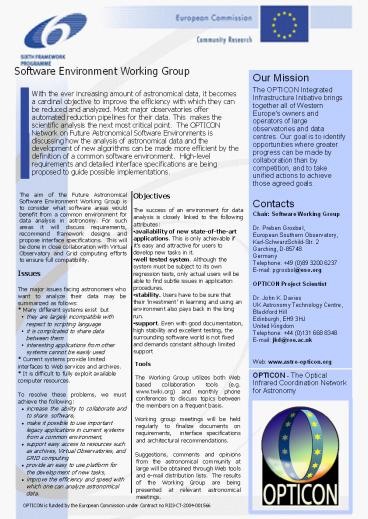Tools PowerPoint PPT Presentation
1 / 1
Title: Tools
1
Software Environment Working Group
With the ever increasing amount of astronomical
data, it becomes a cardinal objective to improve
the efficiency with which they can be reduced and
analyzed. Most major observatories offer
automated reduction pipelines for their data.
This makes the scientific analysis the next most
critical point. The OPTICON Network on Future
Astronomical Software Environments is discussing
how the analysis of astronomical data and the
development of new algorithms can be made more
efficient by the definition of a common software
environment. High-level requirements and
detailed interface specifications are being
proposed to guide possible implementations.
The aim of the Future Astronomical Software
Environment Working Group is to consider what
software areas would benefit from a common
environment for data analysis in astronomy. For
such areas it will discuss requirements,
recommend framework designs and propose interface
specifications. This will be done in close
collaboration with Virtual Observatory and Grid
computing efforts to ensure full compatibility.
- Objectives
- The success of an environment for data analysis
is closely linked to the following attributes - availability of new state-of-the-art
applications. This is only achievable if it's
easy and attractive for users to develop new
tasks in it. - well tested system. Although the system must be
subject to its own regression tests, only actual
users will be able to find subtle issues in
application procedures. - stability. Users have to be sure that their
'investment' in learning and using an environment
also pays back in the long run. - support. Even with good documentation, high
stability and excellent testing, the surrounding
software world is not fixed and demands constant
although limited support
- Issues
- The major issues facing astronomers who want to
analyze their data may be summarized as follows - Many different systems exist but
- they are largely incompatible with respect to
scripting language - it is complicated to share data between them
- interesting applications from other systems
cannot be easily used - Current systems provide limited interfaces to
Web services and archives. - It is difficult to fully exploit available
computer resources. - To resolve these problems, we must achieve the
following - increase the ability to collaborate and to share
software, - make it possible to use important legacy
applications in current systems from a common
environment, - support easy access to resources such as
archives, Virtual Observatories, and GRID
computing - provide an easy to use platform for the
development of new tasks, - improve the efficiency and speed with which one
can analyze astronomical data.
Tools The Working Group utilizes both Web
based collaboration tools (e.g. www.twiki.org)
and monthly phone conferences to discuss topics
between the members on a frequent basis.
Working group meetings will be held regularly to
finalize documents on requirements, interface
specifications and architectural
recommendations. Suggestions, comments and
opinions from the astronomical community at large
will be obtained through Web tools and e-mail
distribution lists. The results of the Working
Group are being presented at relevant
astronomical meetings.

